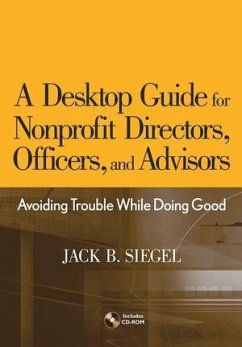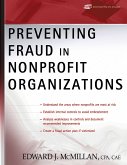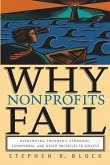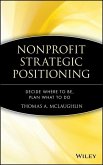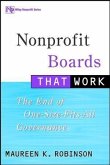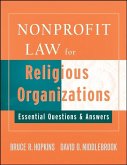How to keep any nonprofit out of trouble, running smoothly, and accomplishing its mission
"Jack Siegel--lawyer, accountant, management consultant, and computer whiz--takes the putative director or officer of a nonprofit organization on a useful and often entertaining voyage throughout the realm of the tax-exempt organizations universe, pointing out its quirks, foibles, and legal liabilities along the way. His handbook will make mandatory--and arresting--reading for those who are already serving as trustees, directors, officers, and key employees of exempt organizations, particularly charitable ones. Siegel's goal, in which he succeeds, is to help directors and officers of nonprofit organizations 'make better decisions.' The book is full of large policy analyses and paragraphs on the details, such as board size, board committees, board meeting formats, the contents of minutes, and the duties of officers.
Salted with some excellent real-life examples, what also sets this book apart from most in its genre is the tone: the writing style, the brusqueness, the bluntness. He complains that too many directors 'check their good judgment at the boardroom door.' He advises individuals who 'desire agreement and demand adulation' to stay off boards; he insists on 'commitment' and 'institutional tension' with the executive director. He warns prospective directors that some organizations want, in addition to time and judgment, 'either your money or your ability to raise money.' To my delight, he extols the virtues of 'some level of expenditures' for qualified lawyers and accountants.
Please join me in adding this most helpful handbook to your nonprofit library."
--Bruce R. Hopkins, Attorney at Law, author of The Law of Tax-Exempt Organizations, Eighth Edition and Starting and Managing a Nonprofit Organization: A Legal Guide, Fourth Edition
"Jack Siegel--lawyer, accountant, management consultant, and computer whiz--takes the putative director or officer of a nonprofit organization on a useful and often entertaining voyage throughout the realm of the tax-exempt organizations universe, pointing out its quirks, foibles, and legal liabilities along the way. His handbook will make mandatory--and arresting--reading for those who are already serving as trustees, directors, officers, and key employees of exempt organizations, particularly charitable ones. Siegel's goal, in which he succeeds, is to help directors and officers of nonprofit organizations 'make better decisions.' The book is full of large policy analyses and paragraphs on the details, such as board size, board committees, board meeting formats, the contents of minutes, and the duties of officers.
Salted with some excellent real-life examples, what also sets this book apart from most in its genre is the tone: the writing style, the brusqueness, the bluntness. He complains that too many directors 'check their good judgment at the boardroom door.' He advises individuals who 'desire agreement and demand adulation' to stay off boards; he insists on 'commitment' and 'institutional tension' with the executive director. He warns prospective directors that some organizations want, in addition to time and judgment, 'either your money or your ability to raise money.' To my delight, he extols the virtues of 'some level of expenditures' for qualified lawyers and accountants.
Please join me in adding this most helpful handbook to your nonprofit library."
--Bruce R. Hopkins, Attorney at Law, author of The Law of Tax-Exempt Organizations, Eighth Edition and Starting and Managing a Nonprofit Organization: A Legal Guide, Fourth Edition
Dieser Download kann aus rechtlichen Gründen nur mit Rechnungsadresse in D ausgeliefert werden.

